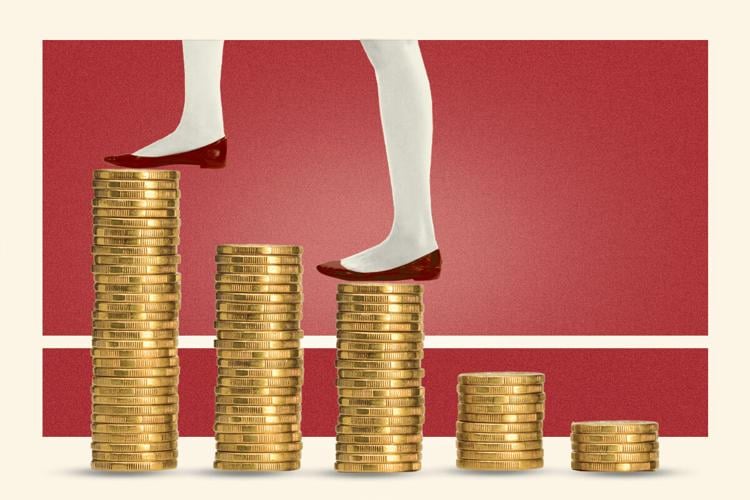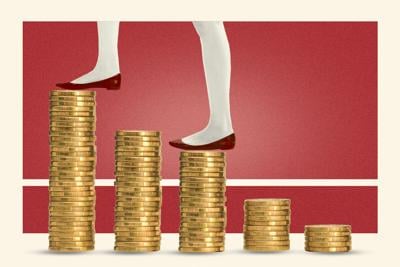Itās never been easy for women in the financial world.
It has, after all, been just 60 years since a woman could open a bank account in Canada without a husbandās signature. And the financial industry still has a lot of work to do when it comes to empowering women.
Research from BMO shows that , and 12 per cent more likely to feel economic pressures from the cost of living and inflation. And it doesnāt help that only 15 to 20 per cent of financial advisers are women, according to a recent report from Sun Life Global Investments.
Despite that ā or perhaps because of that āĢżpc28¹ŁĶųresident Julia Choi, 27, has spent the last decade educating herself about building wealth ā and is used to surprised reactions from financial professionals.
Two years ago, she met with an adviser at a bank to discuss getting a mortgage. āHe saw my account and said, āItās really impressive to have these savings at your age.āāĢż
Choiās experience isnāt unique, experts say, as many Canadian women struggle with a male-dominated financial services industry that sometimes has trouble seeing beyond gender ā a slight that .
Janine Rogan, a Calgary-based CPA and author of āThe Pink Tax,ā believes the financial industry has done a disservice to women, . āThat tells me that financial advisers are not taking women seriously.ā
Choi, who was born in Korea and later lived in Beijing, arrived in Canada alone at 18 to study commerce at the University of British Columbia. She had about $2,000 from her parents, her dadās credit card, and a serious lack of financial knowledge.

Julia Choi has spent the last decade educating herself about building wealth and even launched her own financial advice podcast.
Steve Russell pc28¹ŁĶųStarHer first big mistake came when withdrew $20 in cash from her fatherās card.
āI just didnāt know how it worked,ā she says. Within minutes, she received an international call from her dad, who explained the withdrawal was considered a cash advance and accrued interest right away.
After picking up an informative pamphlet from a bank at orientation day, Choi made an appointment at a local branch. There, she set up her first Canadian bank account, along with a debit card and a credit card that gave her reward points for the movies.
But it wasnāt until she began working for a bank herself in her early 20s that she started to take her finances seriously. Thatās when she learned about the benefits of TFSAs, high-interest savings accounts and other tools that could help grow her funds.
If youāre not sure where to start with your own finances, Rogan suggests checking out online resources, including social media. āThere are lots of financial creators who also teach this stuff for a living, like me,ā she says.
It can be overwhelming, but donāt get discouraged, Rogan says.
She recommends seeking an educational platform or someone who can explain finances in a way that is understandable ā not in a condescending way using financial jargon.
Mississauga-based financial planner Heather Holjevac points out that many financial advisers will provide 30- to 60-minute free consultation where you can ask questions. If youāre thinking about hiring them, make sure to ask about how they work, including how theyāre compensated (banks often compensate employees for usingĢżmutualĢżfunds that charge more fees).
Look for an adviser the same way youād approach a job interview, says Rogan, by making sure they would take your goals and aspirations seriously. And be sure to ask if they invest in the products they are pitching to you.
Trust is important, says Holjevac. If it doesnāt feel right, walk away.
āYou should never feel afraid to ask question,ā Holjevac says. āIf you feel uncomfortable, then that’s not the person you should be working with.ā
Keisha Blair, founder of the Institute on Holistic Wealth and author of āHolistic Wealth,ā found her own financial confidence depleted after being condescended to by financial professionals.
āI was talked down to because I was widowed and young,ā she says. In 2009, her husband died suddenly, making Blair a widowed mother of two young children. She was working as an economist for the federal government and she still wasnāt taken seriously by the financial professionals she turned to for help. Blair says her motives and abilities were questioned, which made her feel guilty which led to second-guessing decisions.
āThose are red flags,ā she says. After her experience, Blair felt there was an urgent need for women to feel financially empowered ā especially other women of colour.
As part of her certified holistic wealth consultant program, Blair offers guidance on how clients can become aware of barriers women of colour face and how to address them with the financial advice theyāre providing. She points out that in the U.S., Black women make 63 cents for every dollar a white man earns. A Black woman would have to work until age 86 to make the same amount of money a white man earns by age 60. It’s even worse for Black mothers who earn just 52 cents for every dollar a man makes. āFor us, building that personal financial identity, and starting early and aggressively, is critical.ā
Blair also recommends women of colour have their own āboard of advisersā; people who share your lived experience and can offer advice.
āSomeone who can say, āthis is what I did, and this is how you can do it too,āā she says. The reality is that if your adviser doesnāt share the same lived experience, itās difficult for them to advise you, even if theyāre trained. āA lot of financial advice is tone deaf to people’s personal circumstances, when it really needs to be highly tailored.ā
Women can also empower themselves through books and podcasts from experts in the field who have gone through similar experiences.
Once she started speaking to wise colleagues at the bank and friends, Choi looked into growing her money. She spent hours researching investments, reading articles and gathering advice from sites like Reddit.
Over time, Choi became so passionate and knowledgeableĢżabout personal finance that she launched her own podcast, āTrust Me ā¦ You’re BrokeāĢżin 2020.
Her approach was straightforward: how to make money, save money, and grow money. The most important strategy sheās adopted when it comes to saving money is setting up auto payments or what she calls the ādivide and hideā method: A percentage of each paycheck automatically goes to her savings and investments.
To date, Choi has managed to save close to $120,000. Her current goal is to buy a house. Her advice to other women: Start with one thing. āBook an appointment with your bank and have a conversation about where you can begin, and then consider one banking product (like a high-interest savings account) that might help you save for the future.ā
Whatever you do, Holjevac says, donāt get down on yourself for feeling lost.
āAs women, we often feel like we should know all the answers,ā she says. āBut if you donāt, you shouldnāt feel bad about it.ā
Remember,ĢżRogan says, the world we live in is still not equal for men and women when it comes to money. Women are paid less and are hit with the pink tax (products and services aimed toward women oftenĢżcosting more ā think haircuts), so they have less money to save and invest.
āTake that frustration that the system isnāt equal and use that as fuel to really step into your confidence,ā Rogan says. āAdvocate for yourself and take your power into your own hands.ā





























To join the conversation set a first and last name in your user profile.
Sign in or register for free to join the Conversation